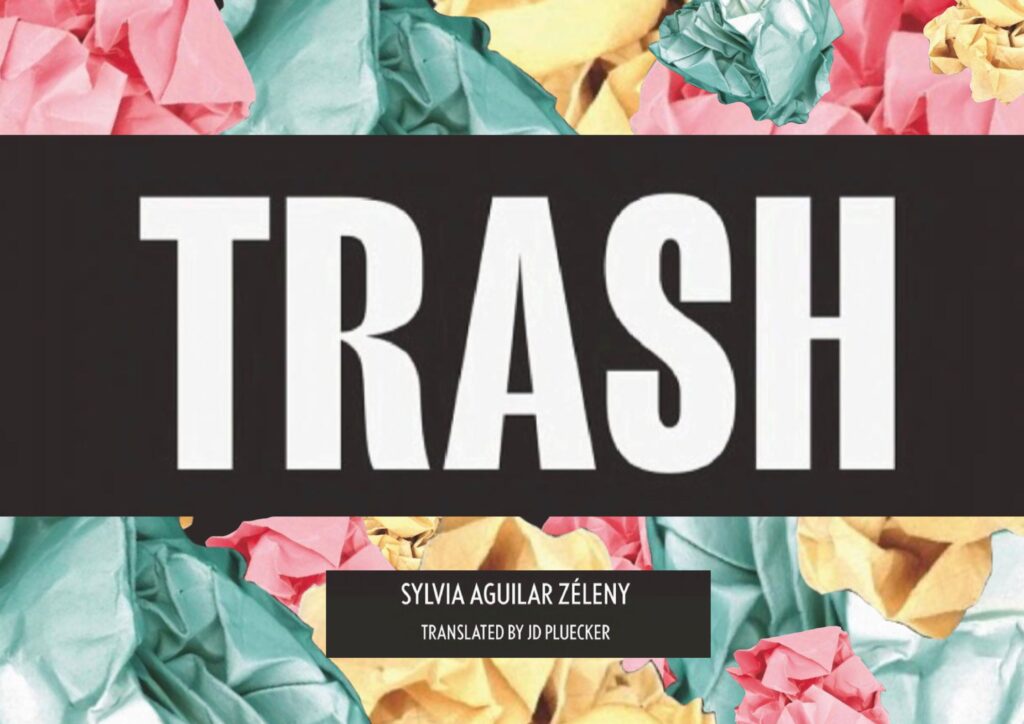How Sylvia Aguilar Zéleny’s Trash Gives Voice to Those the World Wants to Discard

“What he found was a little chunk of plastic, something that could have been a kitchen utensil, the foot or the arm of something, a piece of something bigger, some meaningless trash. No, that’s not quite right. For us, it’s meaningless, but for the kid it’s not. It’s everything for that kid.” – from Sylvia Aguilar Zéleny’s Trash
Trash by Sylvia Aguilar Zéleny, translated from Spanish to English by JD Pluecker, is a debut novel that follows three women living near (or in) a garbage dump close to the Texas border. The novel wants the reader to question—what is trash? Is trash what a person throws away yet can be treasure to another? Is trash the people who live in the novel’s setting, the Dump? Or, is trash the people who inflict harm and pain towards others? Published by Deep Vellum in 2023, Trash tells the stories of three women living in Juarez as they discuss community care, domestic violence, love, loss, and learning to appreciate what one has versus discarding it.
Reyna, Alicia, and Gris are the main characters of the novel, with each chapter bouncing back and forth between their separate points of view. Voice drives the novel forward, as each character has a distinct way of talking, existing, narrating. Time is of no importance. As a writer, I have a deep appreciation for how Zéleny gives voice to the novel. The plot mainly picks up towards the end. The novel is more concerned with the stories of three women who would typically be ignored, abused, or forgotten. Each woman’s section is full of punchy lines, reflective moments, smart, witty dialogue, and thought-provoking ideas.
For instance, Reyna, a transgender woman who talks everyone’s ears off, oversees a tight-knit group of sex workers by offering safe housing, protection, and a much-needed community. In her sections, we get witty banter, sexual innuendos, heartfelt punchy lines from a woman with a big heart. Reyna is always talking to someone, always seeing them for who they are, always offering care, attention, and security.
“…Those damn people are the trash of this world. The trash isn’t what all of us throw away, it’s those people with no soul or heart or decency or any damn thing at all.” – Reyna from Trash
Alicia, originally unnamed for most of the novel, is young but has lived many lifetimes. From being abandoned by her guardian, to experiencing sexual assault by said guardian’s partner, Alicia has no place else to go except for the Dump. Already hardened and hurt by her past, she learns to survive on her own, scavenging the trash for what she needs, selling what she doesn’t, and making do with what she has. Through Alicia’s point-of-view, an appreciation for the trash is gained. She says, “I come from trash” and while others may think it’s a “bad” thing—to Alicia, coming from trash doesn’t carry the same meaning.
“I get what I need from here to live, sometimes even more than the bare minimum. The things here take a beating and keep on ticking, and if they don’t, there’s always more stuff on the way. I find things I didn’t even know I needed, but then later they become just the thing I actually do need. I think the same thing happens to rich people. They buy things they don’t need, things they don’t use. Then when they need them, they’re so dusty and ancient it’s better just to buy them new. That’s the way it is with everything. Am I wrong?” – Alicia from Trash
Gris, on the other hand, is more distant from the trash than Reyna and Alicia. Instead, she is curious about the Dump and the people who live there, so she and her team of doctors and journalists go to interview the people who frequent or live at the Dump. During her investigation, her Tía Mayela is starting to decline from dementia, resulting in Gris having to navigate caring for her Tía or leaving her at a retirement home. Through Gris’s sections, questions arise of what it means to put one’s care and attention to those who need it versus where we want it to go.
This girl has lived through so much both inside and outside the trash dump; she’d adjust to any circumstance. It’s the rest of us who have no idea how to be okay with what we have. – Gris from Trash
Trash makes us wonder who or what gets discarded, who or what is deemed as “lesser,” and is the trash in the garbage even trash at all? By giving voice to three women protagonists, Zéleny naturally uplifts a group of people society may deem trash, especially when considering one is transgender, one is houseless, and one is a queer, unmarried doctor. Trash moves quickly, it pulls us in, invests us in the lives of three phenomenal characters, and just like that leaves us to contemplate our own lives. What do we throw away? What could be saved? Who are we overlooking? The wit, humor, and realness of Trash will have you finishing the book in one sitting; Reyna, Alicia, and Gris, however, will live in your head for weeks after reading.
Order Trash from Deep Vellum here.

